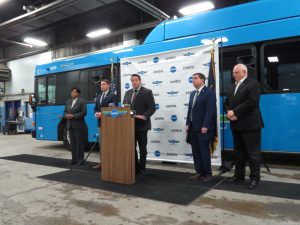The U.S. Small Business Administration (SBA) on Feb. 24 started implementing the first of five changes to the Paycheck Protection Program (PPP) that the Biden-Harris Administration says will promote “equitable relief for America’s mom-and-pop businesses.” The PPP is a forgivable-loan initiative that seeks to help small companies survive the economic dislocations of the COVID-19 pandemic. The […]
Get Instant Access to This Article
Become a Central New York Business Journal subscriber and get immediate access to all of our subscriber-only content and much more.
- Critical Central New York business news and analysis updated daily.
- Immediate access to all subscriber-only content on our website.
- Get a year's worth of the Print Edition of The Central New York Business Journal.
- Special Feature Publications such as the Book of Lists and Revitalize Greater Binghamton, Mohawk Valley, and Syracuse Magazines
Click here to purchase a paywall bypass link for this article.
 The U.S. Small Business Administration (SBA) on Feb. 24 started implementing the first of five changes to the Paycheck Protection Program (PPP) that the Biden-Harris Administration says will promote “equitable relief for America’s mom-and-pop businesses.”
The U.S. Small Business Administration (SBA) on Feb. 24 started implementing the first of five changes to the Paycheck Protection Program (PPP) that the Biden-Harris Administration says will promote “equitable relief for America’s mom-and-pop businesses.”
The PPP is a forgivable-loan initiative that seeks to help small companies survive the economic dislocations of the COVID-19 pandemic. The SBA in January rolled out the third round of the program. As of Feb. 21, more than 1.9 million loans, totaling over $140 billion, had been approved through more than 5,100 lenders nationally in the 2021 round of the program, per SBA data. In New York state, more than 126,000 loans had been approved, totaling more than $11.1 billion, in this latest round.
The five new changes the SBA is going to implement to the PPP are as follows:
• Establish a 14-day, exclusive PPP loan-application period for businesses and nonprofits with fewer than 20 employees;
• Allow sole proprietors, independent contractors, and self-employed individuals to receive more financial support by revising the PPP’s funding formula for these categories of applicants;
• Eliminate an “exclusionary restriction” on PPP access for small-business owners with prior non-fraud felony convictions;
• Remove PPP-access restrictions on small-business owners who have “struggled to make federal student loan payments” by eliminating federal student-loan debt delinquency and default as disqualifiers to participating in the PPP; and
• Ensure access for non-citizen small-business owners who are lawful U.S. residents by clarifying that they may use Individual Taxpayer Identification Number (ITIN) to apply for the PPP.
The 14-day exclusivity period started the morning of Wednesday, Feb. 24, while the other four changes will be implemented by the first week of March, the SBA said.



